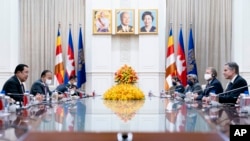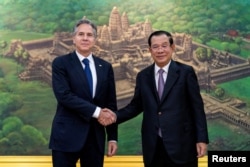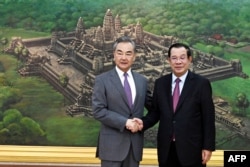Editor’s Note: Anthony Galliano, president of the American Chamber of Commerce in Cambodia (AmCham Cambodia), was part of a regional business delegation who traveled to Washington D.C. last month to meet with US lawmakers, Biden administration officials and think tanks. VOA Khmer’s Mony Say interviewed Galliano about how U.S. investors are viewing the region, and how US-Cambodia political tension is impacting business ties. The interview has been edited for length and clarity.
VOA Khmer: You were part of an AmChams of Asia Pacific delegation on a business trip to DC recently. Can you tell me a bit about some of the highlights from that trip?
Anthony Galliano: We had sixteen American chambers of commerce across the region visiting Washington. So this year, in particular, of course as a chamber of commerce, we are interested in trade. So, it has been 10 years since the US has entered a new trade agreement in the region. And other countries are moving forward on trade. So, the U.S. has not really been too involved in trade agreements, especially pulling out of [the Trans Pacific Partnership]. And there is on the agenda with President Biden is the IPEF, which is the Indo-Pacific Economic Framework, which is the roadmap facilitating greater economic connectivity. So this was really a big part of what we were communicating was a need for a trade pact.
VOA Khmer: Talking about the region, I believe American people would be interested in hearing about the Chinese interest as well.
Anthony Galliano: It was very clear, on the top of the agenda, it was China. There has been a lot of perception that there is division in the government in the US, between Republican and Democratic parties, and on this there seems to be full agreement that it’s time to be less accommodating toward China and to deal with some of the issues that are continuing to be elevated with China. So, Cambodia is very close to China, obviously as an ally, and is perceived as being one of China’s closest allies in the region if not in the world. So I think we are associated, Cambodia with China, by the fact that there is that relationship and that could make the relationship with the US quite challenging. So that was quite evident, and through all these parties that we met, it seemed at minimum China was seen as an unfair competitor. And at worst, the potential for really more heightened tensions with China in terms of maybe directionally going toward the cold war.
VOA Khmer: Considering the recent visit by the US secretary of state to Cambodia, I was wondering how US investment in Cambodia can help the kingdom contain Chinese influence in the country and the region as a whole?
Anthony Galliano: Look, the metrics of Cambodia’s economy are quite interesting. One right now is the US is 40% of all Cambodian exports. And a lot of the raw materials that come in the country, a large percentage of them come from China. So Cambodia is importing materials from China, reworking those materials to a large degree, and the US and Europe are the key trade partners in terms of imports. In terms of FDI, again China is really a key player here. China is anywhere between 50% to 70% or 80% these days of the Foreign Direct Investment, so the US is not a big player in terms of the Foreign Direct Investment in Cambodia, but in other parts of the region, it is. For the U.S. to be more influential, in addition to being the largest importer of Cambodia’s goods, it needs to really escalate its FDI, investment in the country. And I’m not really seeing any major signs that that’s going to happen in the short term.
VOA Khmer: Cambodia leaders often say US aid is hard to use, unlike Chinese aid that comes without any strings attached. Is there a way that the US can take a greater role in balancing out Chinese aid?
Anthony Galliano: I think there has to be some issues which I think the US government is taking a pretty strong stance on. Those would be transparency with the [Ream] naval base, is really a thorn in the side of the relationship. The US has also raised a lot of issues such as human rights, money laundering and corruption. Again, as a chamber of commerce, we are not political. It’s not our interest — our interest is business, but these seem to be on the face of it, issues that are stalling the relationship from improving. And the state department has even put out a position paper just this year, and it was kind of discouraging frankly for businesses to invest in the kingdom. They are essentially also saying that if we invest in entities, let’s say inappropriate for whatever reasons, then those US entities are also culpable. So, it’s not something that makes it easy for US investors to come into the country with those types of positions from the US government.
VOA Khmer: So, in what areas should Cambodia improve to make it easier for US investors to come in and invest more?
Anthony Galliano: Hopefully, the two countries can get to more of a middle ground and resolve between them, which will encourage US investment. My sense is US businesses are probably concerned with the state of the relationship right now, given the perception that China and Cambodia are very close, and the fact that, very clearly from what I’ve heard out of Washington and what I’ve seen from the parties, is that right now there’s quite a bit of challenge in US-Chinese relationship. So, by default, Cambodia seems to be associated with that because of Cambodia’s relationship with China. So if it’s triangular, it seems a bit complicated.
VOA Khmer: In Cambodia, leaders often say they do not take sides and that they like investments from everywhere. I was wondering if the US can elevate the relationship with Cambodia despite it being China’s ally?
Anthony Galliano: Well, it’s inarguable, the facts are that China is investing more than anyone else in the country and has been really over the last five years plus. The country has been changed because of that, the country is growing, the economy has been roaring ahead. It’s really, I think, difficult for Cambodia to say that they’re pretty neutral and a common carrier, let’s say. Of course, they are common carrier in terms of investment, but the fact of the matter is really the largest percentage by far coming from China, and that makes China quite influential in the country with that investment. I don’t see, short term, at least, any major change with the US investing in the country. So the government can say that they would take investments from anywhere — and they do, and that’s absolutely true and it’s a valid fact — but, at the end of the day, where it actually comes from is overwhelmingly from China.
VOA Khmer: As a business man yourself there, what do you want to see with regard to US investment in Cambodia?
Anthony Galliano: I want to step back on that a minute because I also think the US is quite present in terms of investment in the country, but not in what you would call “tangible” investments. We think of investments such as real estate; we visibly see China is doing a lot of real estate investment in the country: banks, insurance companies, investment companies. The US is really very, very influential in what I would call “intangible” investments. US tech companies, for instance, such as Facebook, Google, Microsoft, Amazon. These companies are very present in everyday use in the country. Also US brands in terms of fast food is a great example. Fast food is also omnipresent here. And of course Hollywood movies — extremely popular here.
VOA Khmer: So, do you expect in the next five year the US’s “intangible investments” to go up?
Anthony Galliano: I think the market penetration is as high as you can go. Again, Facebook is huge. Everyone has a Facebook account. There is also hardware tech that is quite popular here, Cisco systems for instance. Tech is still quite substantial. The US is really the best at it, so that sector is doing really well here, whether it’s hardware or software. But, we’re not building buildings. We’re not opening banks. We’re not opening malls. So, that’s still a very, very light investment. But, Ford is the number one selling new car here. So that is another positive. We could do more, but I think American investors have to get much more comfortable with the investment risk of the country. And the relationship between the two countries politically, if that improves, that would really encourage investment.










